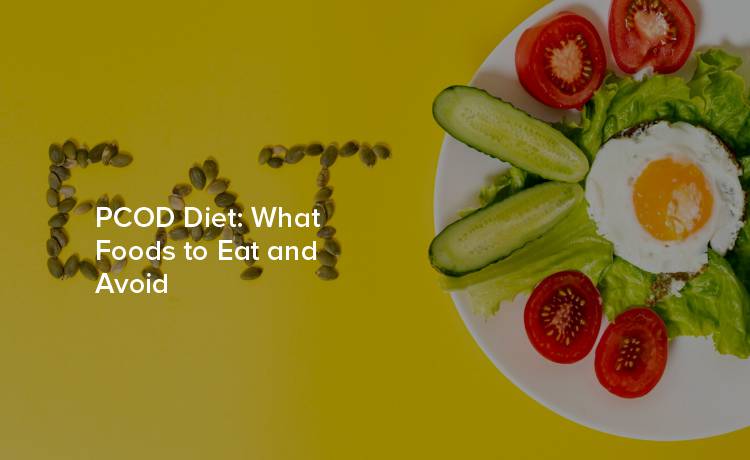
Polycystic Ovarian Disease (PCOD) is one of the most common endocrine disorders in women of reproductive age, affecting as many as one in five women. With symptoms ranging from irregular periods and infertility to weight gain and hirsutism, PCOD can have a significant impact on a woman's quality of life. While there's no official "PCOD diet," making dietary changes can help manage symptoms and improve overall health.
PCOD and diet are intertwined in a complex relationship. The hormonal imbalances characteristic of PCOD can lead to difficulties in maintaining a healthy weight and can also impact insulin resistance. Insulin resistance not only increases the risk of Type 2 Diabetes but also leads to an increase in male hormones called androgens, which can further exacerbate PCOD symptoms.
Women with PCOD often have higher levels of insulin, the hormone that lets your cells turn sugar (glucose) into energy. The asynchrony in insulin and glucose levels can lead to increased insulin resistance, which can contribute to weight gain and make it harder to lose weight. Consequently, a PCOD-friendly diet often focuses on lowering insulin levels and managing weight.
In general, foods that are low on the glycemic index (GI) are considered good for PCOD. These include:
Complex Carbohydrates: Whole grains such as brown rice, oats, and quinoa are excellent choices.
Leafy Greens: Spinach, kale, and other leafy greens are loaded with magnesium, which can help to manage blood sugar levels.
High-Fiber Foods: Fiber can help to slow down the digestion of sugars, which can help to regulate insulin levels.
Lean Proteins: Chicken, turkey, and fish are good protein sources that have a minimal impact on insulin levels.
Healthy Fats: Avocados, nuts, and olive oil can be beneficial in managing cholesterol and maintaining your body's cells.
To stabilize insulin levels and manage weight, it's recommended to steer clear of foods that can cause a spike in insulin, such as:
High-Glycemic Foods: White bread, white rice, and other processed grains can spike blood sugar levels.
Sugary Foods and Drinks: Sodas, candies, and baked goods can lead to a rapid rise in blood glucose.
Red and Processed Meats: These have been linked to increased inflammation, which can worsen PCOD symptoms.
Dairy Products: Some women with PCOD find that dairy aggravates their symptoms, potentially due to the hormones found in milk.
Sticking to a regular eating schedule is crucial for managing PCOD. This ensures that your insulin levels remain stable throughout the day. Try to eat a small meal or snack every 3 to 4 hours to maintain consistent energy levels and avoid large spikes and drops in blood sugar.
Never skip breakfast, as it sets the tone for your metabolism throughout the day. A hearty breakfast of protein and fiber can help stave off cravings and provide lasting energy.
Healthy snacks between meals can prevent overeating and keep your metabolism running smoothly. Consider a mix of protein and fiber, such as apple slices with almond butter or carrots with hummus.
Weight management is a fundamental aspect of PCOD control, as losing just 5% of your body weight can significantly reduce insulin resistance. A combination of diet and exercise often yields the best results.
Be mindful of portion sizes, especially when it comes to high-calorie foods. Becoming attuned to portion control can help manage caloric intake without requiring a complete overhaul of your diet.
Practicing mindful eating can help you become more aware of your hunger and fullness cues. This, in turn, can prevent overeating and promote a healthy relationship with food.
In some cases, supplements can complement a PCOD diet by addressing specific deficiencies that may be exacerbating symptoms.
Inositol is a type of sugar that has been shown to improve insulin sensitivity and lower testosterone levels in women with PCOD. It is often used as a supplement to support the management of PCOD symptoms.
Many women with PCOD are found to be deficient in vitamin D, which can have negative implications for insulin resistance. Supplementing with vitamin D may help to manage PCOD symptoms.
Physical activity can aid in weight management, improve insulin sensitivity, and help regulate your menstrual cycle.
A combination of aerobic exercise and strength training is recommended. Aerobic exercise can help burn calories and fat, while strength training can increase lean muscle mass, which helps to burn more calories at rest.
The key to sticking with an exercise plan is to find activities that you enjoy. Whether it's hiking, dancing, or cycling, any activity that gets your heart rate up can contribute to the management of PCOD symptoms.
Stress can worsen PCOD symptoms by increasing cortisol levels, which can affect insulin resistance and hormone balance.
Incorporating relaxation techniques such as meditation, yoga, or deep breathing exercises can help manage stress levels and improve hormone balance.
Building a strong support network or seeking professional help can also be critical in managing stress and, subsequently, PCOD symptoms.
It's worth noting that while some dietary recommendations for PCOD management are backed by scientific evidence, others are based on anecdotal experience. Always consult with a healthcare professional before making changes to your diet or lifestyle, especially if you have a medical condition like PCOD.
Although there is no one-size-fits-all solution for managing PCOD through diet, making informed choices about what you eat and integrating healthy lifestyle practices can play a crucial role in symptom management. By focusing on lowering insulin resistance, regulating blood sugar, and promoting a healthy weight, you can take proactive steps toward managing PCOD and improving your overall well-being. For the best gynecology treatment in Hyderabad, Citizens Specialty Hospital is the top choice for expert care and personalized solutions.